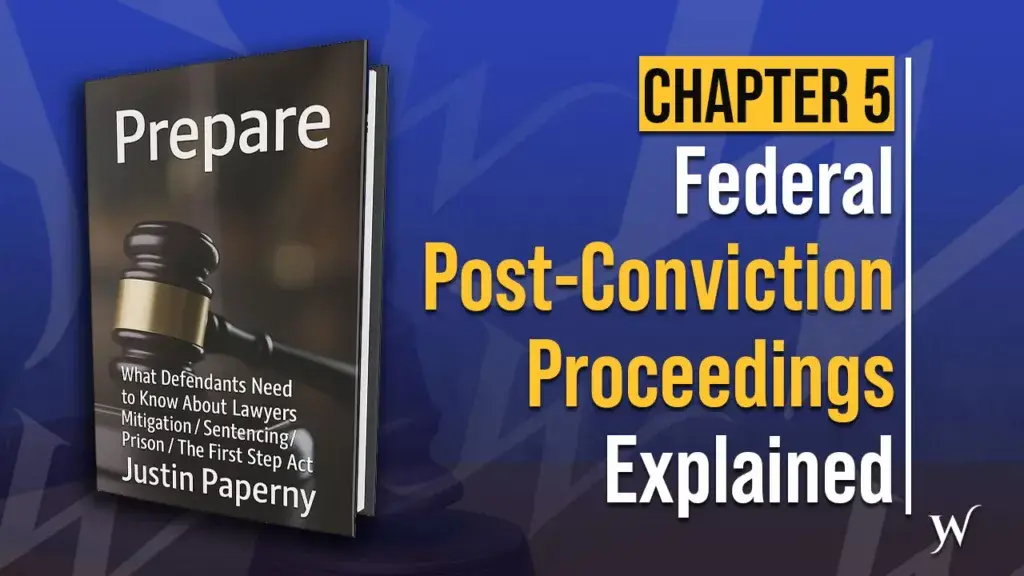Table of Contents
How Decisions Are Made in the Criminal Justice System
This chapter explains how criminal justice proceedings unfold and why defendants need a working understanding of each stage. Hiring a lawyer is only the start. The system involves investigators, prosecutors, judges, and procedures that most people never learn about until they are already involved. Knowing how cases begin, how decisions are made, and what comes after a conviction helps defendants communicate better with counsel and prepare for sentencing.
Why Hiring a Lawyer Is Only the Beginning
When you hire a criminal defense lawyer, you expect an advocate to guide you through criminal justice proceedings and the broader system. The reality is that hiring counsel is only the start of a long, often confusing process. Understanding how the system works can help you make better decisions and communicate more effectively with your attorney.
Federal data shows that when prosecutors file charges, a conviction and sentencing follow in most cases. Judges often end hearings with the same line: “I sentence you to the custody of the Attorney General.” Many federal judges rarely deal with post-sentencing issues, and defendants tend to know even less. Most people enter the system without understanding how they got there or what comes next.
How Criminal Justice Proceedings Begin
Most Americans only know the basics: police arrest, prosecutors charge, and some people go to jail. The actual structure is far more complex. When I was in trouble, I didn’t understand how the system functioned, nor did I initially view my actions as criminal. That lack of understanding made a hard situation even harder.
The system is run by career bureaucrats—law enforcement officers, investigators, and prosecutors—whose job performance often depends on securing convictions. Learning how criminal justice proceedings operate gives defendants a better chance of contributing to their own defense and advocacy campaign.
Prosecutors and investigators coordinate closely, and their collaborations sometimes push the boundaries of procedure. Defendants should assume this reality and educate themselves accordingly. A methodical approach—learning the rules, anticipating decisions, and building assets over time—can influence outcomes.
In federal prison, I came across Machiavelli’s line, “Fortune favors the bold.” Moving through this process requires being informed and taking deliberate action. Know who the stakeholders are, understand their incentives, and do what you can to influence the narrative. If sentencing seems likely, work to show why you merit leniency. Seth Godin’s point about being a “purple cow” applies here: you must stand out for the right reasons.
For more on early preparation, see our guides on the presentence investigation report and federal sentencing.
Pre-Charge Phase: Many Cases End Here
Many people first learn there’s a problem long before an arrest: a call from an agent, a subpoena, a grand jury target letter, or a quiet inquiry through counsel. Not every investigation becomes a criminal case, and not every problem ends in handcuffs.
In my own case, I ignored the early warnings. I figured I could explain my way out of trouble and just move on from the bad choices I made at Bear Stearns and UBS. Instead, I made statements I did not understand, I kept working, and I gave the government more material that worked against me. Too many defendants follow my path, including one last week who got caught lying during a proffer session.
During this pre-charge phase, your conduct can influence:
- whether charges are filed at all
- which charges the government pursues
- whether the case resolves as civil, regulatory, or criminal
- how the prosecutor and judge view your character and judgment later.
Silence, panic, or blind trust in “it’ll work out” all carry a cost. Use this stage to organize records, get qualified counsel, and start documenting what you’re doing to fix the damage you caused.
Structure of Criminal Justice Proceedings
The United States does not have a single criminal justice system. Instead, several operate in parallel:
- Federal system
- State systems
- Military system
- District of Columbia system
Law enforcement follows defined procedures when pursuing charges. The process becomes easier to understand when viewed as a structured sequence: law enforcement and prosecutors operate as opponents in a controlled environment, and the judge acts as the referee to ensure due process. Authoritative references such as the DOJ Justice Manual and the U.S. Courts overview of criminal cases provide more detail on these procedures.
Key Stakeholders in Criminal Justice Proceedings
Defendants often focus only on the judge and the prosecutor. In reality, several decision-makers influence the outcome:
- Investigating FBI agents – Build the case, interview witnesses, and collect records. They care about cooperation, consistency, and whether you look like a risk or a resource.
- Prosecutors – Decide whether to charge, what to charge, and how to resolve the case. They care about deterrence, fairness, and whether you accept responsibility in a documented way.
- Defense counsel – Translates the system for you and advocates for the best available outcome. A prepared client makes their job easier and their arguments stronger.
- Magistrate judges – Handle first appearances, detention, and early motions. Their early impressions can echo throughout the case.
- District judges – Decide key motions and impose the sentence. They read the presentence report, the sentencing memo, character letters, and watch your conduct from the bench.
- Probation officers – Write the presentence investigation report and supervise you after release. Their assessment influences both the guideline calculation and the narrative the judge reads.
When I went through this process, I only saw “the judge.” I didn’t appreciate how much influence each stakeholder had, or how my choices showed up in their reports and recommendations. Understanding their incentives is the first step toward changing how they perceive you. The earlier you start, like David Moulder, the better.
Steps in Criminal Justice Proceedings
Below is an outline of how cases typically progress. While specifics vary by jurisdiction, these steps form the foundation of most proceedings:
Reporting a Crime
Law enforcement learns of possible wrongdoing through direct observation, citizen reports, investigations, or interviews.
Pre-Arrest Investigation
Officers collect evidence to confirm a crime occurred, identify suspects, and establish probable cause for an arrest.
Arrest
A suspect is taken into custody. Arrests may include a warrant and can involve public exposure or searches of the person or property.
Booking
The suspect is fingerprinted, photographed, and processed. Depending on the case, the person may be held until a bail hearing.
Post-Arrest Investigation
Investigators often continue gathering information to strengthen the government’s position.
Deciding to Charge
Prosecutors review evidence and decide whether charges are appropriate, considering witness credibility and case strength.
Filing the Complaint
A formal complaint is submitted, converting the suspect into a defendant.
Magistrate Review
A magistrate judge evaluates the allegations and determines if probable cause exists for detention.
First Appearance
The defendant is advised of rights and charges. Bail may be set.
Bail
The judge evaluates the seriousness of the allegations, the defendant’s background, flight risk, and ties to the community.
Preliminary Hearing
The magistrate judge decides if the case has enough support to move forward. Defendants may waive this stage.
Grand Jury Review (Federal Cases)
Most federal felonies require a grand jury to determine whether sufficient evidence exists to proceed.
Arraignment
Defendants are formally charged and enter a plea.
Plea Bargaining
Prosecutors often negotiate plea agreements to avoid trial. Most federal cases resolve through pleas.
Pre-Trial Motions
Defense attorneys may challenge evidence or seek additional information through motion practice.
Trial
If the case proceeds, the defendant has the right to a jury trial. A jury decides guilt based on evidence presented.
Post-Conviction Proceedings
If convicted, the next phases include sentencing, potential appeals, and, if necessary, preparing for federal prison. The FBI’s white-collar crime resource also provides insight into investigative methods relevant to many cases.
Practical Checklist for Defendants
At each stage, there are specific actions you can take to avoid making things worse:
Investigation / Pre-Charge
- Stop casual explanations to colleagues, friends, or anyone who might be speaking with agents.
- Retain qualified counsel with experience in your type of case and courtroom.
- Start gathering documents, timelines, and records that will later support your story; the goal in the end is for the government to take the totality of your life into consideration.
Post-Arrest / Charging
- Be honest with your lawyer about your conduct and finances.
- Keep a written chronology of events while your memory is fresh.
- Avoid social media posts, texts, or emails about the case.
Pre-Sentencing
- Engage fully in the presentence interview; prepare in writing first.
- Begin restitution efforts, community service, and personal development you can document.
- Work with your lawyer on a sentencing memo that shows who you are beyond the offense conduct.
When defendants start treating sentencing preparation like a full-time job, everything changes. Many still go to prison, but they often receive shorter sentences, and their documented work can support earlier release and more freedom afterward.
Common Mistakes That Make Proceedings Worse
In and after prison, I kept meeting people who made the same errors I did:
- Talking too much – Trying to “clear things up” with agents, coworkers, or friends who might be cooperating.
- Hiding or deleting records – Destroying emails or documents that later show up anyway, making everything look worse.
- Leaving everything to the lawyer – Assuming counsel will handle decisions you should be involved in: restitution, character letters, release planning.
- Ignoring the presentence report – Treating the PSI interview as a casual chat, not the foundation of the judge’s understanding of your life.
- Waiting until the week before sentencing – Scrambling to show change instead of documenting it over months.
The system notices patterns. A defendant who owns the problem, documents change, and shows consistent effort over time looks very different from one who only reacts when a court date appears on the calendar.
Understanding these steps helps defendants work more effectively with counsel and take an active role in preparing for what may come next.
If you want to understand what these procedures mean for you, arrange a call with our team.
Thank You,
Justin Paperny is an ethics and compliance speaker and founder of White Collar Advice, a national crisis management firm that prepares individuals and companies for government investigations, sentencing, and prison. He is the author of Lessons From Prison, Ethics in Motion, and the upcoming After the Fall. His work has been featured on Dr. Phil, Netflix, CNN, CNBC, Fox News, The Washington Post, and The New York Times.
FAQ
What starts criminal justice proceedings?
The process begins when law enforcement receives a report or observes conduct suggesting a crime.
Who decides whether to file charges?
Prosecutors review evidence and determine whether charges are appropriate.
Do all federal cases require a grand jury?
Most federal felonies do, but defendants may waive indictment in some circumstances.
What happens at an arraignment?
The defendant is formally charged and enters a plea
How often do cases go to trial?
Rarely—most federal cases resolve through negotiated pleas.
Can a defendant challenge evidence before trial?
Yes, through pre-trial motions filed by the defense.
What determines bail?
The judge considers flight risk, criminal history, case severity, and community ties.
What happens after conviction?
The case proceeds to sentencing and potentially to appeals.
How important is understanding the process?
It helps defendants communicate with their lawyer and anticipate decisions.
Why does self-education matter?
A better understanding of the system can influence outcomes at sentencing.
Can prosecutors continue investigating after arrest?
Yes, post-arrest investigations are common.
What role does a magistrate judge play?
They review early proceedings, probable cause, and initial detention decisions.




